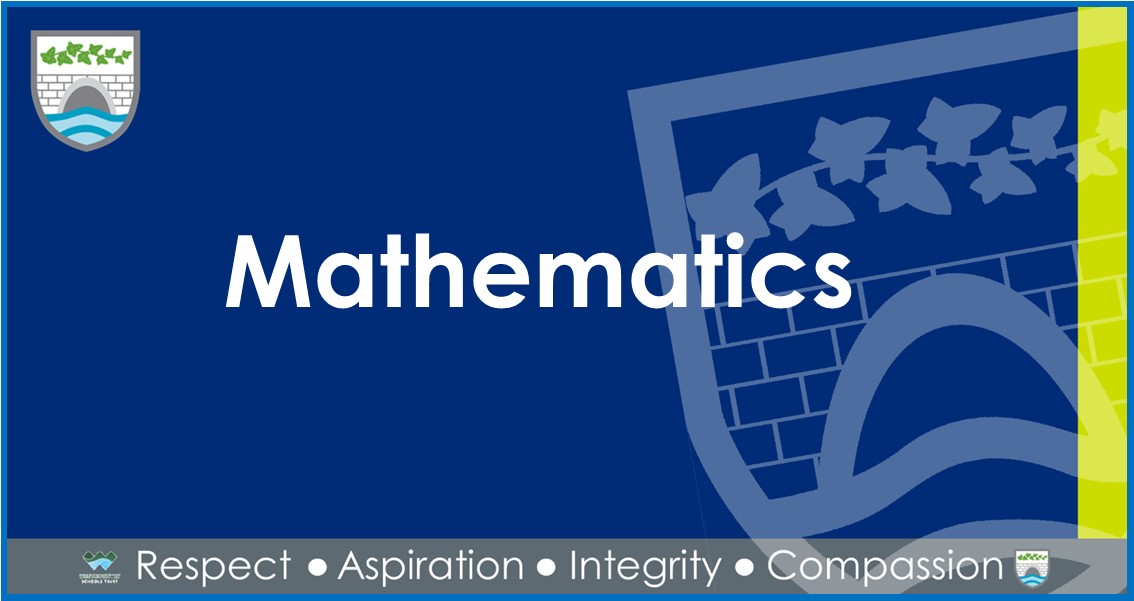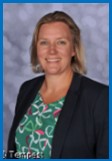Mathematics
Please note: if you are viewing this page on a mobile phone, you may need to view in Landscape in order to view all of the content.

 Head of Department:
Head of Department:
Laura Davies
Welcome to the Mathematics Department at Ivybridge Community College. We are a fun and dynamic Department whose aim is for students to enjoy excellent and productive working relationships with their Mathematics teachers and through collaboration develop their knowledge and love of the subject.
We believe that all students of varying abilities and interests should be given the opportunity to achieve their full potential in Mathematics at a level and rate of progress appropriate for them.
At Ivybridge, we believe that Mathematics provides opportunities for students to be creative and independent, but it also allows for co-operation and debate to take place through logical thinking. It enables communication to be precise, elegant and informed. Above all Mathematics should be enjoyed. As a Department we believe that there is true value in understanding Mathematics and being able to apply Mathematics as opposed to simply learning how to answer exam questions.
Key Stage 3
Throughout Key Stage 3 students will be encouraged to develop their mathematical knowledge through a variety of topics and activities.
We aim to develop students’ numerical, spatial and practical skills, to improve their ability to reason and approach problems in a logical and systematic manner. Students should build on Key Stage 2 and connections across mathematical ideas to develop fluency, mathematical reasoning and competence in solving increasingly sophisticated problems.
Through the mathematics content, students should be taught to:
Develop fluency |
Reason mathematically |
Solve problems |
Within this framework we aim to stimulate students’ interest and their enjoyment in the subject.
Course content
Across the three years of Key Stage 3, students will study the main content strands of Mathematics...
Number |
Algebra |
Ratio, Proportion
|
Geometry
|
Probability |
Statistics |
...in order to prepare them fully to begin their GCSE course in Year 10.
Number
Students will learn how to use a range of computational methods and apply them to problems, using calculators where appropriate.
Algebra
Students will learn about relationships and patterns between numbers, operations, develop simple algebraic techniques and apply these as appropriate.
Ratio, Proportion and Rates of Change
Students will learn about proportional relationships and ratio and be able to apply these to a range of problems in a variety of contexts.
Geometry and Measures
Students will learn about the properties of, and patterns within, various shapes, along with the application of various measures to shapes.
Statistics
Students will learn how to collect, represent and analyse and interpret data in one or two variables, using a variety of mediums.
Probability
They will learn about probability, both experimental and theoretical, including suitable diagrams and set notation.
Students at Key Stage 3 follow a Scheme of Work that has been designed to encourage them to spot more subtle links between topics, and develop their mathematical reasoning and independent learning through mastery.
Key Stage 4
All students follow the Edexcel GCSE (9–1) in Mathematics (1MA1) course. There are six content domains covered within the specification...
Number |
Algebra |
Ratio, Proportion
|
Geometry
|
Probability |
Statistics |
There are two overlapping tiers of entry, with students being entered for the most appropriate tier. Although students generally follow the same tier that they begin in Year 10, movement between tiers is possible. The final level of entry will be decided at the time of entry for GCSE, which is normally in January of Year 11.
This qualification consists of three equally-weighted written examination papers at either Foundation tier or Higher tier. Paper 1 is a non-calculator assessment and both Paper 2 and 3 are calculator assessments. Each paper is 1 hour and 30 minutes in duration and each paper contains a total of 80 marks. Each paper has a range of question types; some questions will be set in both mathematical and non-mathematical contexts.
The qualification will be graded and certificated on a nine-grade scale from 9 to 1 using the total mark across all three papers, where 9 is the highest grade. The available grades are as follows:
Foundation tier
Grades 1 to 5
Higher tier
Grades 4 to 9
(Grade 3 allowed)
Core Mathematics
Core Maths is available to provide students with an alternative to A Level Mathematics and is available to any student who has gained a grade 5 or higher at GCSE. Although much of the content of the course is also on the GCSE Higher Tier syllabus, students will learn how to use mathematics to solve contextualised problems, explore new ways to use technology with mathematics and develop their ability to assimilate and use information presented in a variety of forms.
Core Maths is a one year course and is worth the same number of UCAS points as any other AS qualification.
Course Content
Examination Board
Pearson / Edexcel
(Mathematics in Context)
Topic Areas and Content
Applications of Statistics |
Probability |
| Students will learn how to use: Averages (including moving averages), measures of dispersion (standard deviation, inter-quartile range), measures of correlation, lines of regression, sampling. |
Students will learn how to use: Tree diagrams, Venn diagrams, probability notation, probability to analyse risk and inform decision making. |
Linear Programming |
Sequences and Growth |
| Linear programming is a mathematical technique that enables users to maximise profit or minimise cost by setting and analysing straight line graphs. Linear programming is used extensively in business, industry and engineering. |
Students will learn how to apply the mathematics of sequences and growth in a variety of real-life contexts and problem-solving tasks. These may include topics such as financial mathematics, population growth, epidemics, earthquakes and radioactive decay. |
Higher Education and Career Opportunities
A Level courses and, as such, is recommended for students studying...
Psychology |
Economics |
Any
|
Information Technology or Computing |
Geography |
Business Studies |
Core Mathematics will support students intending to study degree courses with mathematical content.
A Level Mathematics and Further Mathematics
A Level Course Outline
During this course students will learn to extend their knowledge of algebra and geometry from GCSE and explore the ways in which mathematics can be applied in the real world. Areas which they will cover include:
- New topics such as coordinate geometry, series, differentiation and integration, all of which are highly algebraic and are an excellent introduction to mathematics at a higher level.
- Branching further into core mathematics with topics such as logarithms and exponentials, radian measures and higher level trigonometry.
- More complex pure mathematics including trigonometric proofs, further differentiation and integration as well as numerical methods for finding solutions.
- Further and more complex work on coordinate geometry as well as vectors in 3D. Lots of the mathematics studied in earlier core modules is linked together here.
- Mechanics and Statistics: this applied paper introduces students to mathematical modelling of everyday experiences, like driving a car, throwing a ball up in the air, walking across a bridge and playing snooker. In order to be successful in this area you need to be able to visualise a situation and simplify the forces acting on different parts of it. You will have a better understanding of how the physical world operates and how to use mathematics to predict what will happen next following this module. Using statistics, you will also get to: Interpret measures of central tendency and variation, extending to standard deviation, understand and use simple, discrete probability distributions (calculation of mean and variance of discrete random variables is excluded), including the binomial distribution, as a model, calculating probabilities using the binomial distribution and use the Normal distribution as a model, finding probabilities using the Normal distribution.
This course will help students develop:
Fluency in the key mathematics topics for science and engineering |
Organising and presenting a structured and logical argument |
Confidence in mastering challenging ideas and overcoming difficulties |
Thinking in an abstract and symbolic way |
Develop confidence and enthusiasm in their approach to the subject |
Higher Education and Career Opportunities
Mathematics and Further Mathematics at A Level are fascinating, rewarding and satisfying subjects and form the basis for many other subjects. Both qualifications or solely doing A level Mathematics are highly regarded by employers and Higher Education establishments, with many degrees containing some elements of Mathematics.
Careers in...
|
|
Sciences |
|
Engineering |
|
Medicine |
|
Business |
|
Economics |
|
|
Geography |
|
Design |
|
...amongst many others, will benefit from mathematical studies at a high level.
Course Content
A level Mathematics
We have very recently moved exam boards and our current year 12 and all future students will be following the Edexcel A level Mathematics course.
Pure Mathematics Paper 1 |
Pure Mathematics Paper 2 |
| 33.33% of the Qualification (100 marks) |
33.33% of the Qualification (100 marks) |
Content Overview |
Details (Externally Assessed) |
|
| Topic 1 Topic 2 Topic 3 Topic 4 Topic 5 Topic 6 Topic 7 Topic 8 Topic 9 Topic 10 |
Proof Algebra and Functions Coordinate Geometry in the (x,y) plane Sequences and Series Trigonometry Exponentials and Logarithms Differentiation Integration Numerical Methods Vectors |
Written Examination of two hours 100 marks of short and long answer questions split by topic. -------- Paper 1 and Paper 2 may contain questions on any topics from the Pure Mathematics content -------- Students must answer all questions -------- Calculators can be used in the assessment |
Statistics and Mechanics Paper 3 |
| 33.3% of the Qualification 100 Marks |
Content Overview |
Details (Externally Assessed) |
|
| Section A: Statistics | ||
| Topic 1 Topic 2 Topic 3 Topic 4 Topic 5 |
Statistical Sampling Data Presentation and Interpretation Probability Statistical Distributions Statistical Hypothesis |
Written Examination of two hours -------- Paper 3 will contain questions on topics from the Statistics content in Section A and Mechanics content in Section B -------- Students must answer all the questions -------- Calculators can be used in the Assessment. |
| Section B: Mechanics | ||
| Topic 6 Topic 7 Topic 8 Topic 9 |
Quantities and Units in Mechanics Kinematics Forces and Newton's Laws Moments |
|
A Level Further Mathematics Course Outline
Whilst A-Level Mathematics focuses on core topics such as calculus and trigonometry, A-level Further Mathematics takes a deeper look at mathematical principles. It is important to note that you must be completing A-level Mathematics alongside this Further Mathematics Course.
There are several benefits involved in studying A-level Further Mathematics. Your problem-solving abilities will be significantly enhanced, which can be useful both personally and professionally. You will increase your capacity for taking on new information and knowing how to process it accurately.
Course Content
A level Further Mathematics
We have very recently moved examination boards and our current Year 12 and all future students will be following the Edexcel A level Further Mathematics course.
There will be four 1 hour and 30 minutes written papers, each worth 25% of the final qualification and each containing 75 marks.

